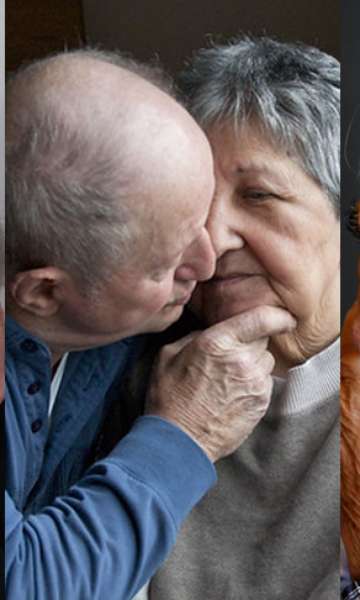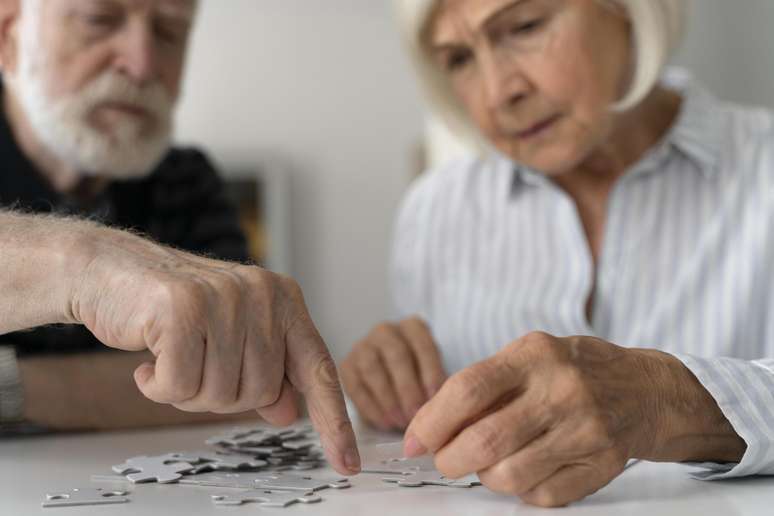Number of people with dementia in Brazil could exceed 5 million by 2050; Health workers also need care, warns geriatrician
A recent study revealed that at least 1.76 million people over the age of 60 are living with dementia in Brazil and this number is expected to grow even further.
Law No. 11,736/2008 established September 21 as National Alzheimer’s Disease Awareness Day. The date draws attention to the conditions of this type of dementia, which affects 70% of those affected, especially in this context of increasing number of cases affecting an aging population.
According to the Ministry of Health, the forecast is that there will be 2.78 million Brazilians affected by dementia at the end of this decade and 5.5 million in 2050. According to the World Health Organization (WHO), more than 50 million people live with dementia in the world – and the projection of the entity is that it will reach the threshold of 150 million by 2050.
Alzheimer’s is a progressive, neurodegenerative disease with no cure, which mainly affects people over the age of 65, affecting memory, language and perception of the world.
In an interview with Earth you, the geriatric doctor at Health at home, Simone de Paula Pessoa Lima explained the first signs of the disease and how family members can find help.
Disorientation is one of the first symptoms
According to the professional, the early signs of Alzheimer’s include loss of recent memory, such as repeatedly forgetting appointments, the location of an everyday object or the names of familiar people, as well as:
- Difficulty performing usual activities;
- Disorientation in relation to time and space;
- Changes in judgment;
- Loss of interest in social activities.
When these symptoms are noticed, it becomes essential to seek specialized medical evaluation for early diagnosis.
The disease has several stages
The doctor says that in the initial phase the impact is felt from the diagnosis, until the patient begins to have difficulty carrying out more complex activities, often causing mood swings and irritability.
“At this stage, the patient’s autonomy can be preserved with light support,” he says.
As the disease progresses, dependency increases, causing confusion, more significant behavioral changes, and difficulty understanding and communicating. Treatment now includes constant supervision and support for activities of daily living.
In the advanced stage, the patient requires comprehensive care, with hygiene and even nutritional assistance. Complications such as immobility may need to be managed. “Adjusting care must always prioritize the patient’s comfort and dignity,” the specialist emphasizes.

19-Year-Old Raises Eyebrows After Having Alzheimer’s Disease
Treatments do not slow the progression of the disease
Available treatments for Alzheimer’s include medications such as cholinesterase inhibitors and memantine, which can help temporarily minimize cognitive and behavioral losses.
In addition to medications, nonpharmacological interventions, such as cognitive stimulation, physical activity, and emotional support, are essential to optimize quality of life. However, the doctor emphasizes that while these medications can slow the progression of symptoms, they do not stop the progression of the disease.
Family members need to seek support
Alzheimer’s disease can be even more difficult for those who live with the person diagnosed. The doctor says family caregivers initially face emotional and social challenges.
“In addition to the stress of the patient’s progressive dependence and behavioral changes (agitation, aggression), there is the emotional impact of seeing a loved one lose his or her cognitive abilities,” he explains.
In the moderate and advanced stages, physical discomfort appears more marked due to the need for help with bathing, transfers (bed/chair) and changes in position in bed.
To cope with these situations, the geriatrician advises the family member to seek professional help and support.
“Participation in support groups and learning behavioral management and self-care techniques are also essential to avoid emotional and physical exhaustion, as well as planning ahead for the future of the disease,” she indicates.
Hospitalization may be the best solution
Despite the social prejudices that the hospitalization of a loved one can cause in the family members involved, the doctor explains that choosing a specialized clinic to care for an elderly person with Alzheimer’s can be a valid option when the level of assistance required exceeds the family’s capabilities.
“In these institutions, the patient can receive continuous professional care, focusing on symptom management, comfort and safety, especially in the more advanced stages of the disease. For the caregiver, this decision can relieve stress and emotional burden, allowing him or her to focus on the patient’s well-being and self-care,” says the expert.
Good habits can inhibit disease
Alzheimer’s disease does not yet have a specific form of prevention, however doctors believe that maintaining an active mind and a good social life, guided by good habits and styles, can delay or even inhibit the manifestation of the disease.
According to the Ministry of Health, the main ways to prevent not only Alzheimer’s, but also other chronic diseases, are:
- Study, read, think, keep your mind always active;
- Do arithmetic exercises;
- Smart games;
- Group activities;
- Do not smoke;
- Do not consume alcoholic beverages;
- Have a healthy and regulated diet;
- Get regular physical activity.
Source: Terra
Ben Stock is a lifestyle journalist and author at Gossipify. He writes about topics such as health, wellness, travel, food and home decor. He provides practical advice and inspiration to improve well-being, keeps readers up to date with latest lifestyle news and trends, known for his engaging writing style, in-depth analysis and unique perspectives.









